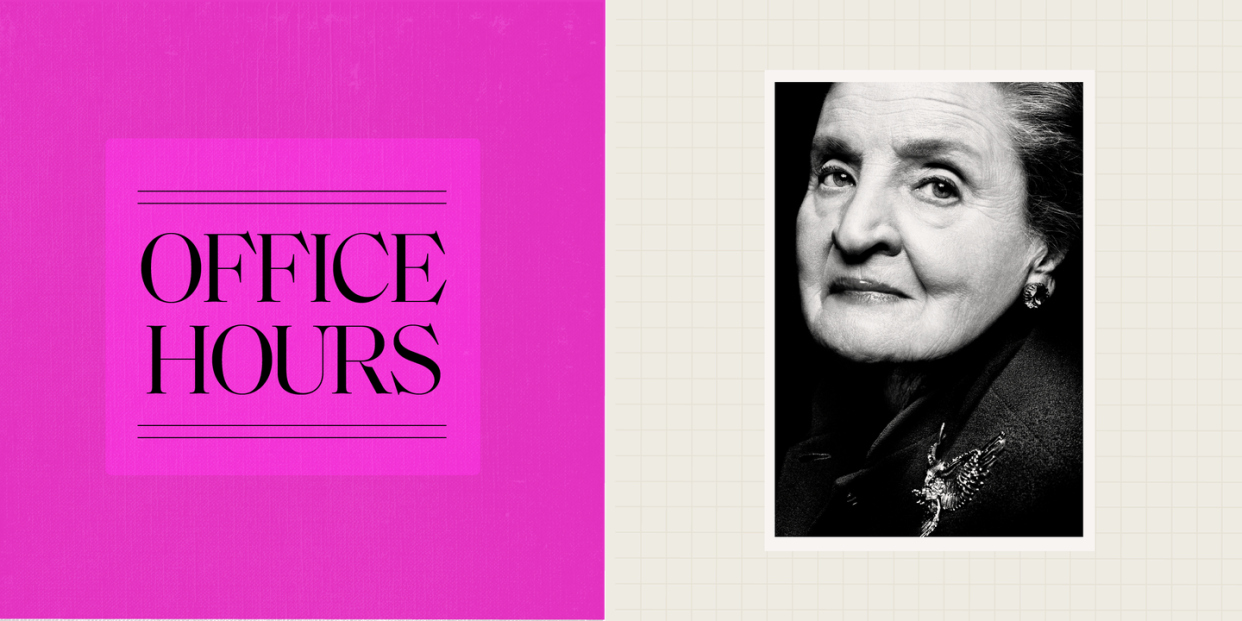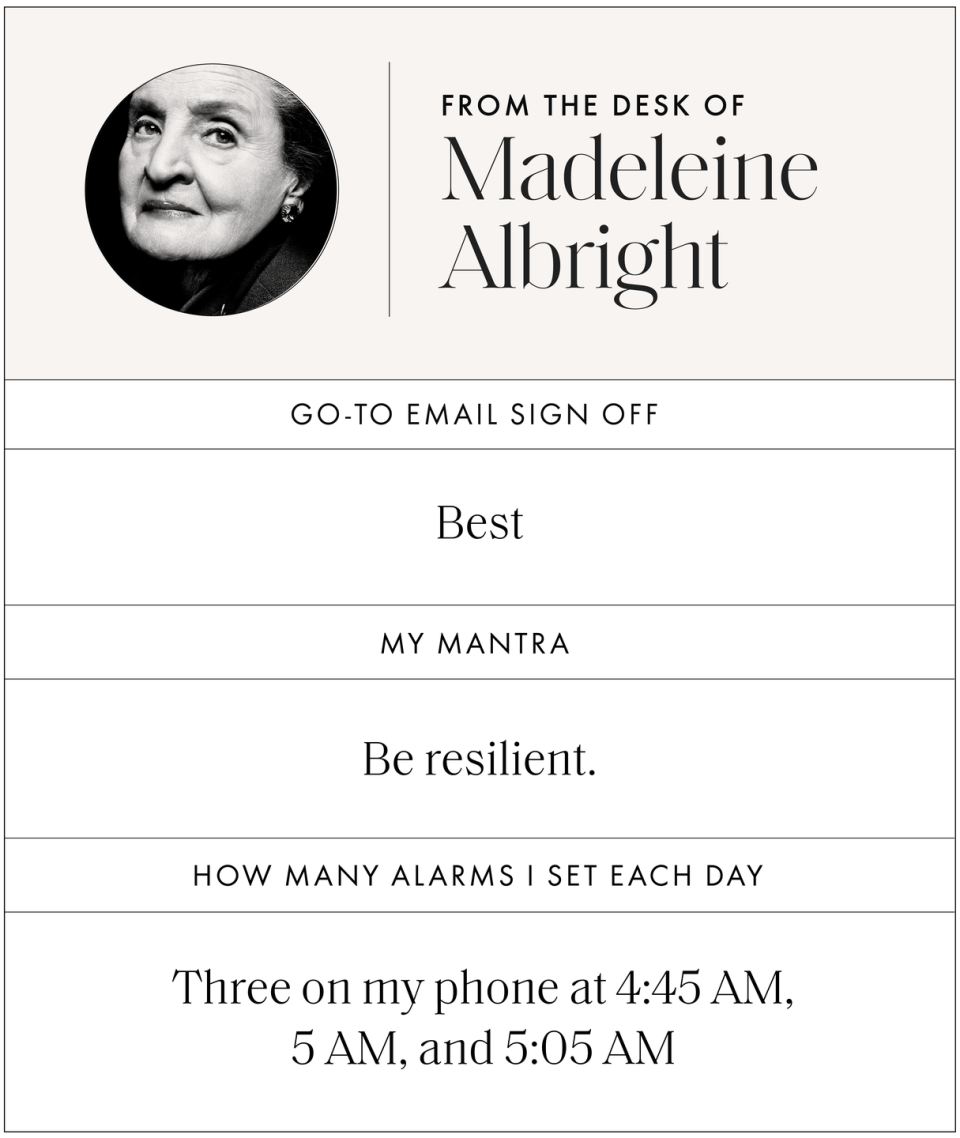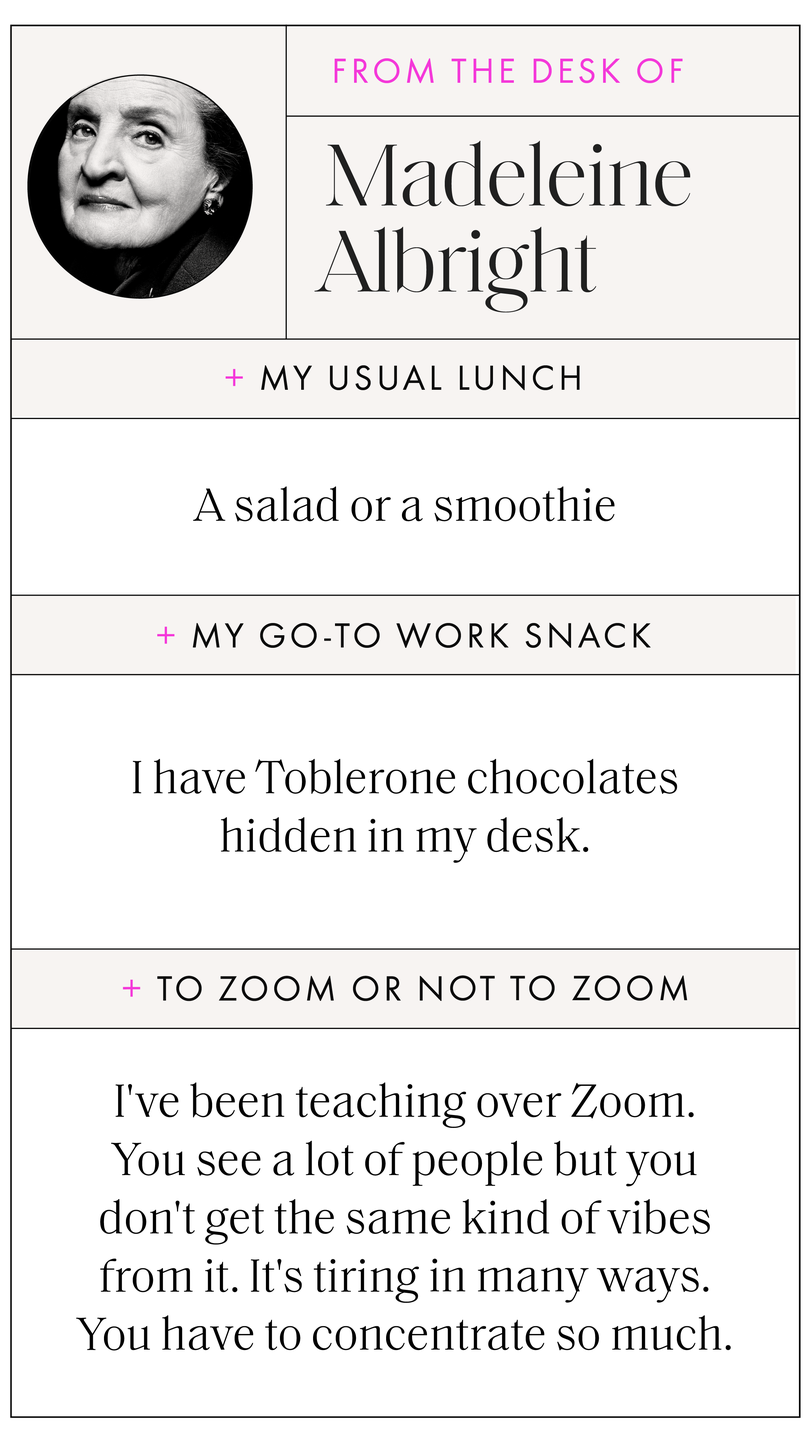Madeleine Albright Refuses to Spend the Rest of Her Life Taking Laps Around the Garden

In ELLE.com's monthly series Office Hours, we ask people in powerful positions to take us through their first jobs, worst jobs, and everything in between.
When Madeleine Albright, 82, first chose the title for her new memoir, Hell and Other Destinations, she didn't realize how relevant it would actually become. "People think we're going through hell," she tells me over the phone, both of us home due to the COVID-19 pandemic. "I would like us to go to other destinations."
Albright is best-known for becoming the first female U.S. secretary of state under President Bill Clinton. But as she writes in her book, her career didn't stop—or start—there. In her own words, Albright didn't have a “serious job” until she was 39 years old and working as then-Senator Ed Muskie’s chief legislative assistant. After leaving the State Department, she continued her storied career, becoming the chairman of the National Democratic Institute and founding a global strategy firm, while also teaching at Georgetown University, writing, and giving speeches.
She admits, "I never thought that I would have the kind of life I've had." Below, Albright opens up about the worst career advice she ever received, how she uses accessories to communicate on the job, and why she believes we need to be optimists during the coronavirus pandemic.
My first job
"My first job ever was selling bras when I was in high school in Denver, Colorado. I learned you have to really put yourself into the shoes of the person that you're dealing with and be polite and solicitous and listen. It really made a difference."

My best job experience
"Being Secretary of State and sitting behind the sign that said the United States, especially since I wasn't born here, and I am a very grateful American. [Editor's note: Albright was originally born in Czechoslovakia, now the Czech Republic. Her family moved to the U.S. in 1948.] I'll never forget on July 4, 2000, I was able to give naturalization certificates to new citizens. I heard this man, as he walked away, say, 'Can you believe it? I'm a refugee, and I just got my naturalization certificate from the secretary of state.' I went up to him afterwards and I said, 'Can you believe that a refugee is secretary of state?' That is one of the most amazing things that ever happened to me."
The worst career advice
"I had wanted to be a journalist. I had been one of the editors of my college paper, and I married a journalist. We moved to Chicago where he had a job, and we were having dinner with his managing editor. [The editor] looks at me and he says, 'So what are you going to do, honey?' I said, 'I'm going to get a job on a newspaper.' Even though there were three other papers in Chicago at the time, and he said, 'You don't want to compete with your husband, so go do something else.' It turned out it was good advice, but at the time, I thought, 'I can't believe that I've been addressed this way by somebody.' I do think that people don't know what they're saying and how insulting they really can be."
How to communicate with accessories
"[In 1993] there was a poem in the papers in Baghdad that compared me to an unparalleled serpent. I had a snake pin, and I decided to wear it when I talked about Iraq. A journalist asked, 'Why are you wearing that snake pin?' I told the story. Then I thought, well this is fun. I went out, and I bought a lot of costume jewelry to depict what we were going to do that day. On good days, I wore flowers and butterflies and balloons. On bad days, I wore carnivorous animals and spiders and things."
My favorite pin
"My family spent World War II in London during the blitz. I was just a little girl. My father would broadcast over BBC, and they began every broadcast with Beethoven's Fifth Symphony that begins, da-da-da-dum, which in Morse code means V for victory. I've got a V for victory pin on for this book because we need a victory over the virus.
[One of my favorite pins is from when] I was down in New Orleans after Katrina. I was at a dinner, and this man comes up to me with a pin with amethyst leaves. He said, 'My father's sitting over there, and he won a Purple Heart, but my mother died as a result of Katrina. He gave her this pin as an anniversary present, and we want you to have it.'"

On opening up doors for other women
"You're in a meeting and you think to yourself, 'I'm not going to say something. Everybody will think it's stupid.' Then some man says it and everybody thinks it's brilliant, and you're really mad at yourself for not speaking. The most important thing I saw was that you needed to have another woman in the room, so she could say, 'Madison said it exactly right,' because that's what men do with each other. This is where I came up with the most famous statement I ever made: 'There's a special place in hell for women who don't help each other.' You really want to have support and create the possibility for people around you to also have chances. You don't want to be the only woman in the room."
On trying new things
"When I first got a call from the producers of Gilmore Girls, they called me up and said would I mind if somebody played me? I said, 'Yes, I mind. I want to play myself.' That was my first TV experience. Then I did Parks and Recreation. When Madam Secretary came on, Téa Leoni asked me to come and talk to her about what it's like to be Secretary of State. I was on the show a couple of times.
I like to have fun. I played the drums at the Kennedy Center with Chris Botti. People have said to me over and over again, they didn't realize that I had a sense of humor. That is the thing that has really kept me going. I don't want to end my life taking laps around my garden. There's a lot I do want to do. I'm going to fight gravity."
On not retiring
"For me, the word 'retirement' is not a good word. I've said this over and over again about myself: I've always wanted to make the next phase of my life more interesting that what I've done before—not easy if you've been secretary of state. It took me a long time to find my voice. Once I found it, I'm not going to be quiet. The part I'm having a hard time with is that I have been fighting old age. There's no question. Given what's going on now [with the pandemic], all of a sudden there's a separation now with the elderly. I've avoided that category, but I accept who I am."
How to move forward in our new normal
"I have been in situations, or my parents have, where there was no control. We had no control over what happened during World War II. We've been refugees twice. The only thing we can control is our mood. That is the advice that I have for this particular period. We are not in control of how the virus happened or what is happening. We are in control of our behavior and following the guidelines. Making impossible demands [of yourself], or saying I have to do these 10 things by tomorrow—first of all, we're going to be holed up for quite a while longer, so you've got time. I think it's a great time to read and exercise and meditate a little bit about the good things in life. I truly do believe we have to be optimists and be resilient."
You Might Also Like

